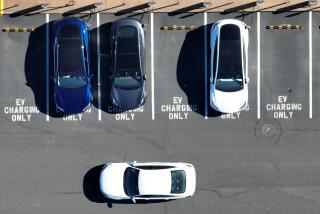Electric Vans May Be Making a Comeback
- Share via
DETROIT — The Department of Energy said Thursday that it has joined with six U.S. utilities in hopes of revving up a largely forgotten automotive market: electric vehicles.
The department, Detroit Edison and General Motors told a news conference that 31 electrified compact vans will be shipped to the United States from GM’s Bedford truck division plant in Luton, England.
The $21,500 mini-vans, which carry GM’s Griffon nameplate, are the first electric vehicles to be mass produced on an assembly line, according to the GM and utility officials. They have a minimum range of 50 miles between eight-hour battery recharges.
There were high hopes for electric vehicles during the oil shocks of the 1970s. But stable gasoline prices and sluggish developments in making lighter, more powerful batteries have kept the electric- vehicle market in the experimental stage. The GM vans, for example, won’t go faster than 50 m.p.h. and contain one ton of traditional lead-acid batteries.
But the utilities say there’s a niche to be tapped in the commercial van market. It is comprised of businesses that own fleets of vehicles that are used primarily in low-speed, stop-and-go urban traffic and are brought back to a central location at night.
“There are about 2.4 million light trucks and vans in the United States doing work that could be handled by electric commercial vehicles,” Detroit Edison Chairman Walter McCarthy said.
Paul Brown, director of electric and hybrid propulsion for the Department of Energy, said, “Realistically, we see a market of these vehicles in the next year and a half approaching hundreds. Remember, the electric (vehicle) is a very simple device, and mechanics are becoming expensive.”
Proponents of electric vehicles long have touted the advantages of no engine maintenance, reliable operation in cold weather and centralization of pollution at electric power plants, where it can be more easily controlled.
But gasoline prices failed to reach the $2- to $3-a-gallon level that was predicted in the late 1970s, when electric vehicle programs swept the auto industry. Heavy batteries, limited range and lengthy recharging time remain difficult problems to solve.
“It’s clear that the batteries are keeping electric vehicles from happening,” said Bradford Bates, program manager for electric vehicles at Ford Motor. “There are some niche markets, but for wider use, you’ll have to have a better battery.”
Chrysler spokesman Doug Nicoll said the company is “monitoring the situation. But we’re not in it.”
Even the ranking GM executive at the news conference, John Rock, GMC Truck & Coach division manager, said electric vehicles will remain experimental for the foreseeable future.






